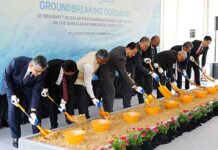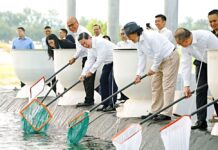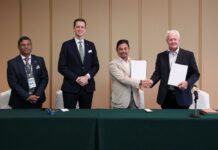
Thailand’s Enserv Holding will launch Brunei’s first sorghum cultivation and processing initiative by year’s end, leveraging the crop’s versatility for applications in food, health and renewable energy.
Through its local arm Enserv BN, the company signed a tenancy agreement with the Department of Agriculture and Agrifood (DOAA) on September 4. It will establish a sorghum nursery at the Bio Innovation Corridor in Rimba, with three hectares allocated for cultivation at the Agricultural Development Area (KKP) in Tungku, supported by processing facilities for flour and biomass.
The initial sandbox phase will test the commercial feasibility of Enserv’s EMF3 platform (Food, Fuel, Fundamentals), which positions sorghum – a grain originating from Africa – as a “super crop” with potential for a value chain spanning food to renewable fuels. If successful, the project will advance to commercial-scale production.
Enserv Chairman Tanachat Pochana explained that the sorghum grain, which is gluten-free and rich in micronutrients, will be processed into resistant starch flour to produce EMF Rice, a low-calorie carbohydrate alternative suitable for diabetics and those managing their weight.
The stalks can be converted into solid biofuels such as biocrude oil and biocoal, while the sweet sap, traditionally used for molasses, can be fermented into bioethanol with further applications in biobased energy storage. By-products from these processes, such as bran and distillers’ dried grains, can also be used for animal feed.
Pochana added that sorghum requires ten times less water than rice, with each hectare able to sequester up to 20 tonnes of carbon dioxide per crop cycle, making it a relatively climate-friendly grain.
“This is why we call EMF3 a ‘breakthrough life ecology’, because it combines natural ecosystems with new technologies to address food, energy, climate and health security, while also promoting economic growth,” said Pochana.
Enserv’s background is in renewable energy, having been awarded a 257.8 MW Solar Utility PPA by Thailand’s Provincial Electricity Authority in 2015, with its foray into agriculture driven by the company’s research and development.



Brunei’s FDI and diversification drive draws Enserv
Pochana was first introduced to Brunei through Francis Wong, a Brunei-born businessman based in Australia, during the Australia-ASEAN Business Forum, which Wong currently serves as chair.
Despite Brunei’s smaller size, Pochana said the country’s drive to attract foreign direct investment (FDI), backed by government agencies and facilitation by the Brunei Economic Development Board, made it a promising destination. On his first visit, Brunei’s relatively untapped market and its vision of becoming a halal food hub convinced him to set up operations.
Thailand’s Ambassador to Brunei, Her Excellency Boosara Kanchanalai, welcomed more Thai businesses to be part of Brunei’s FDI push to support economic diversification.
She added that while Thailand has established itself as a leading exporter of agricultural commodities, its national strategy is shifting beyond quantity to focus on building value chains with “high-quality, safe, diverse and nutritious food”.
“We are committed to seeing Enserv become a shining example, paving the way for more Thai investors to follow in their footsteps,” she said during the signing.
“This project demonstrates how a single investment can serve multiple national priorities — food, health and clean energy. It is also a platform for the transfer of knowledge and technology from our Thai professionals to Bruneian counterparts.”

Food is one of Brunei’s five priority sectors for economic diversification, with a strategy focused on developing export-oriented value chains built around sustainable, high-value commodities.
Foreign direct investments have been central to this effort, driving the production of spirulina, blue shrimp, barramundi and muskmelon, among others.











